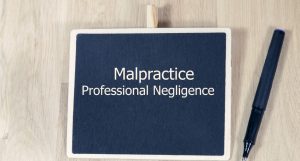Table of Contents
Professional negligence might arise when a professional acting on your behalf makes an error, leading you to incur a financial loss.
The professional against whom you might lodge a claim is someone to whom you’ve remunerated for expert advice, such as a solicitor, barrister, surveyor, architect, accountant, financial adviser, or tax consultant. This is due to the professional’s obligation to serve you with the diligence and expertise anticipated of a reasonably adept individual operating within that field.
Myerson Solicitor’s Dispute Resolution lawyers explore restrictions on professional negligence claims and redress via the Legal Ombudsman.
What is Professional Negligence, and Against Whom Can I Make a Claim?

Limitations to Professional Negligence Claims
Claims of professional negligence can’t be made against public entities like the NHS, local councils, or Government departments such as the Department for Work and Pensions or the Department for Health and Social Care. While these entities might owe you a duty of care under another legal facet, they wouldn’t meet the legal standard for negligence.
Claims of professional negligence can’t be initiated against trade unions, although such unions might direct you to a professional, like a solicitor or legal representative, against whom you might lodge a claim if they’ve been negligent.
Is Subpar Service Distinct From Negligence?

You might have received inadequate service from a professional, perhaps not handling your affairs as efficiently as expected. Maybe you found yourself persistently prompting them for updates, or they didn’t promptly revert to your calls and emails.
While this can be quite vexing, subpar service doesn’t equate to negligence. The best solicitor specialising in professional negligence won’t be of assistance in lodging a claim for mere poor service. In such instances, redress might be sought from the Legal Ombudsman.
Grievances Regarding Subpar Service
If you’ve encountered inadequate service from a professional, there are measures to adopt without resorting to a conveyancing solicitor:
- Initially, peruse any commitment letter given by the professional. Typically, it outlines the firm’s internal grievance procedure, which you’d adhere to when airing dissatisfaction about the received service. Begin by liaising with the individual overseeing your case, their superior, or department lead. The commitment letter should also denote the firm’s Complaints Manager or Partner who addresses your grievance if it’s not amicably settled initially.
- The Complaints Manager or Partner’s contact might be located on the firm’s website without an engagement letter or lacking the aforementioned details. Alternatively, inquire with your point of contact at the firm for the Complaints Manager’s coordinates. If all else fails, direct your grievance to the firm’s directors or partners.
- Generally, a firm allows up to 8 weeks to address your formal written grievance.
- If post that duration, the firm hasn’t engaged you or their engagement is unsatisfactory, your grievance can typically be escalated to an Ombudsman (either the Financial Ombudsman or the Legal Ombudsman for grievances against a solicitors’ firm) – an autonomous entity offering complimentary services.
- It’s imperative that the firm’s grievance procedure is observed, and the stipulated response duration allowed before the Ombudsman evaluates your grievance. If the firm engages your grievance, their response should guide you on escalating to the Ombudsman.
Time Constraints for Addressing the Ombudsman

It’s pivotal to recognise the time constraints for addressing the Ombudsman. If you intend to liaise with the Legal Ombudsman about a solicitor or barrister, your grievance must be lodged within:
- 1 year from when the issue transpired
- 1 year from realising the problem
- 6 months post the firm’s concluding response
To address the Financial Ombudsman, grievances are typically lodged within six years of the issue arising. If this period has elapsed, the Financial Ombudsman might still entertain your grievance if lodged within three years of recognising (or when you ought to have recognised) the issue.
Regardless, procrastination in liaising with the Ombudsman is ill-advised.
Compensation via the Legal Ombudsman
The Legal Ombudsman possesses the authority to mandate a legal expert to compensate you up to £50,000. The sum the Financial Ombudsman might decree varies based on when the issue transpired and when the grievance was lodged. Redress from the Ombudsman could either refund fees disbursed to the professional or compensate for the subpar service received.
Accepting the Ombudsman’s concluding decision typically binds you and precludes any legal action against the professional. Prior to endorsing the Ombudsman’s final verdict, especially if contemplating a claim of professional negligence against the professional, soliciting a solicitor’s counsel is wise.


